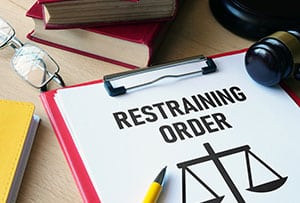What Is A Utah Restraining Order?
 Are you being harassed by a former spouse, co-worker, or someone that once played a role in your life? No matter what the circumstances are, a restraining order is the first line of defense in protecting you against physical, mental, sexual and emotional abuse.
Are you being harassed by a former spouse, co-worker, or someone that once played a role in your life? No matter what the circumstances are, a restraining order is the first line of defense in protecting you against physical, mental, sexual and emotional abuse.
Understanding Utah Restraining Orders
If you are feeling threatened by another person, but they have not physically done something to you law enforcement cannot do anything to protect you. The protective order is the tool to provide that protection. Restraining orders are often referred to as protective orders. When the order has been filed, the other party must stop harming the other person.
The purpose of a restraining order is to protect you from further harm from someone who has hurt you, to prevent the abuser from coming near you, or to keep a person from harassing you. The order will establish what the person can and cannot do, typically barring them from coming to the scene of the violence which normally includes your home, place of work, or apartment. There are a variety of different acts that are considered domestic violence including the following:
- Assault
- Burglary
- Criminal mischief
- Criminal restraint
- Terrorist threats
- Criminal sexual conduct
- Criminal trespass
- False imprisonment
- Harassments
- Homicide
- Kidnapping
- Lewdness
- Sexual assaults
- Stalking
How Does a Restraining Order Protect Me?
A judge will sign an order of protection if you are a victim of domestic violence. The order of protection requires the abuser to obey the orders of the court. The protective order provides specific information as to what the abuser can and cannot do. If the abuser violates the protection order in any way, they can be arrested and ordered by the court to attend mandatory professional domestic violence counseling. Depending upon the situation the court may also order the abuser to pay for costs that resulted from the abuse. Loss of earnings and attorney fees are the most common costs associated with protective orders.
How Long Is A Temporary Restraining Order Valid?
Restraining orders are issued as a temporary restraining order. You must return to court on the date indicated on your initial restraining order (usually 10 days or less from the date issued). The hearing will include testimony from you and others including the abuser. Keep a copy of the restraining order with you if you are concerned the abuser might bother you in some way. The restraining order serves as a legal document for local law enforcement to arrest the abuser if they are in violation of it.
When Can I File Criminal Charges?
You can file criminal charges against the abuser for acts of domestic violence. Criminal charges can be filed at your local police department. If there are serious crimes against you, prosecution may take your case to state criminal court. Contacting police is the best thing to do if the other party is violating the order. Actual police record showing signs of injury or use of a weapon can help you in a court of law to find the abuser guilty.
Why You Need an Attorney
If you are being threatened in any way, hire an attorney to protect your legal rights. If you have children with the other party, their safety and well-being will be placed as a top priority in the case. Since domestic violence cases can be emotionally trying, working with a skilled Utah attorney is the best decision. Kelly Peterson Law provides legal services for individuals seeking protective orders. Contact our Provo law firm to schedule a consultation today.

